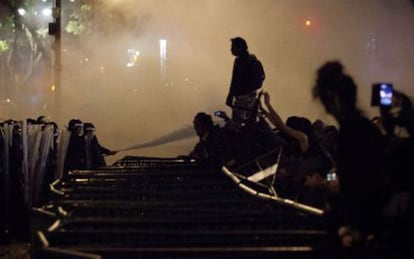A wave of indignation sweeps across Mexico
The president loses momentum in the face of demonstrations and discontent over violence


Mexico has reached a stalemate. After almost two years of forward movement with the reforms, the country that, until recently, was surprising the world is now living in an atmosphere of uncertainty. The disappearance and death of 43 student teachers has led to the highest level of indignation the Enrique Peña Nieto administration has faced. On the symbolic anniversary of the Mexican Revolution, this unease has paralyzed the most important universities around the country and it has led to calls for a demonstration that is expected to draw an enormous crowd.
Mexican President Enrique Peña Nieto seems to have lost momentum for the first time during his term amid the upheaval. The president’s main initiative was focused on the economy - specifically opening up the oil industry. Unfortunately, his measure met with a rapid decline in the price of crude oil. And his political credibility has suffered. He has had to face strong criticism after a report revealed that his wife’s house, where the couple planned to live after he finished his term in office, was sold to her by a real estate firm which happens to be a subsidiary of a construction company that won several government contracts. The president’s attempt to tackle suspicions led to unprecedented situations like the swift cancellation of a contest for a $4.8 billion railway public contract that had been awarded just three days before to various businesses, including the construction company in question. Mexican First Lady Angélica Rivera, a well-known former actress, also took the stage to offer a remorseful defense of the real estate deal and to announce the sale of the family home.
Beyond these shakeups in the presidential palace, the main and most important upheavals are coming from the street, where the protests keep going. Highways are blocked, party headquarters vandalized, public buildings burned and even airports seized. These events have created a worrisome tense atmosphere over the last few weeks. Once inactive radical groups are now growing stronger, especially in the states of Guerrero, Oaxaca and Michoacán. This movement does not limit itself to the south or to responding to the tragic death of the student teachers. The swell of indignation is not only the result of a certain unease among more or less radical students and teachers or even the consequence of the parents’ disappointment in the police investigation. The Iguala case, with its venomous blend of impunity and corruption, has reached deeper and it has put the traditional institutions on guard. Businesses, leaders of public opinion, intellectuals and even the Church have raised their voices about the growing gloom hovering over the political landscape.
Bishops gathered at a plenary session spoke specifically about a “national crisis” and they asked the president to take swift action “to regain credibility and the public’s confidence.” In unusual fashion, Banco de México warned of “the deterioration of confidence in the economic institutions,” due to “recent events.” The bank has called for “a firm hand” to halt the growing violence. And the large political parties, among them the leftist Party of Democratic Revolution (PRD), are imploding because they supported Iguala’s mayor. Now they admit openly that the people’s discontent has strained their already flimsy credibility.
“This is a crisis that involves many factors; it is not the result of a single cause,” says historian Enrique Krauze. The news of the details of the assassination shocked the nation. Mexico suddenly finds itself facing its past. There is justified and widespread indignation over accumulated offenses that goes from disgust over corruption to the disenchantment of many voters who wanted PRI to know how to deal with the violence. But the answer from Mexican society has no concrete form or leader. And so the president can still change direction.”
The news of the details of the assassination shocked the nation. Mexico suddenly finds itself facing its past”
Enrique Krauze
Until now, Peña Nieto has used a two-pronged strategy. After several days of silence, the administration has drawn the line. It has accused the most violent demonstrators of “promoting instability and social unrest and, above all, of attacking the integrity of the nation.” But, given the support they receive from the parents and the solidarity others feel with them, the administration has opted for appeasement. The government has created a fund for the victims and, behind the scenes, the Chamber of Deputies has approved the allocation of $30 million to 14 rural teachers’ colleges throughout Mexico. Ayotzinapa, the hotbed of the protests, will receive the largest portion of the package. At the same time, high ranking officials maintain open channels of communication with the parents and they have accepted one of their thorniest proposals: the creation of a committee of international experts who will have access to the case files. The group will review the investigation and analyze authorities’ handling of the victims.
Still, people are waiting for a more comprehensive response. Institutional Revolutionary Party (PRI) leaders admit, in private, that some party members feel the same way. They trust the president’s political acumen and they are waiting for a reaction that will allow them to regain momentum, especially, after the last blows they received.
“The government took off very well with the reforms, but now it seems disconcerted, doubtful, and this generates uncertainty,” says political analyst Rubén Aguilar Valenzuela. “The president should act now and put himself in front of the people. If there is something good in this crisis, it’s that it shows a new society has emerged, much more demanding, and at the same time one must answer with clarity.”
Peña Nieto still has a few possibilities up his sleeve. A notable move would be a cabinet reshuffle with the prosecutor general as the main target and the national pact against impunity and violence which the government advertised.
Now that the details of the students’ case are clear and the main suspects have been arrested, Peña Nieto seems to have a free and clear path for his reforms. Yet, perhaps because the situation remains tense, the president has not called on any civic organization or politician for help.
In the meantime, the crisis only gets worse.
Translation: Dyane Jean François
Tu suscripción se está usando en otro dispositivo
¿Quieres añadir otro usuario a tu suscripción?
Si continúas leyendo en este dispositivo, no se podrá leer en el otro.
FlechaTu suscripción se está usando en otro dispositivo y solo puedes acceder a EL PAÍS desde un dispositivo a la vez.
Si quieres compartir tu cuenta, cambia tu suscripción a la modalidad Premium, así podrás añadir otro usuario. Cada uno accederá con su propia cuenta de email, lo que os permitirá personalizar vuestra experiencia en EL PAÍS.
¿Tienes una suscripción de empresa? Accede aquí para contratar más cuentas.
En el caso de no saber quién está usando tu cuenta, te recomendamos cambiar tu contraseña aquí.
Si decides continuar compartiendo tu cuenta, este mensaje se mostrará en tu dispositivo y en el de la otra persona que está usando tu cuenta de forma indefinida, afectando a tu experiencia de lectura. Puedes consultar aquí los términos y condiciones de la suscripción digital.








































